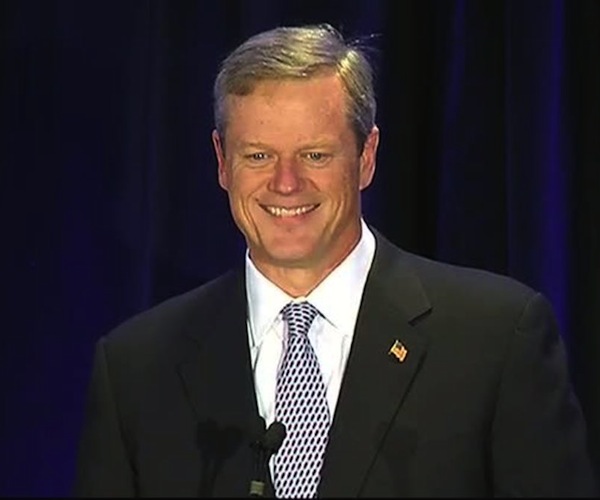Film Commentary: Tax Break for MA Filmmakers First — Hollywood a Far Second
Many of the films being made in Massachusetts are by independent Massachusetts filmmakers, most of them documentarians. Why is nobody talking about how to subsidize them via the tax credit?

Massachusetts Governor Charlie Baker — proposing to end the film industry tax credit.
By Gerald Peary
I am a Cambridge resident, a longtime Boston film critic and cinema professor, and the filmmaker of two feature documentaries, the most recent, Archie’s Betty, playing currently at the Institute of Contemporary Art. Naturally, I have been following the discussions, pro and con, for extending the Massachusetts tax credit for film production with the deepest interest. (According to today’s Boston Herald, “Senate President Stanley C. Rosenberg said senators are exploring ways to modify the state’s controversial film tax credit and “scale it back,” offering a potential compromise in a debate between Gov. Charlie Baker and the House, who have been at odds over the tax credit’s benefits.”)
You might assume that, as a film person, I would be 100% behind keeping the tax credit as is, and especially since I have friends who work steadily on the Hollywood movies which come to Massachusetts, and depend on such movies for their livelihood. But I’m a fence sitter on the issue. On the one hand, I don’t want Hollywood movies to stop being made in Massachusetts, and I certainly don’t want my film-production associates to be without work. On the other hand, I’m mystified that the discussions about the tax credit have been exclusively focused on whether or not to subsidize film projects originating outside Massachusetts.
What is left out of the debate are the many films being made in Massachusetts by independent Massachusetts filmmakers, most of them documentarians. Why is nobody talking about how to subsidize them? I think I am quite typical of local filmmakers. In 2014, I spent approximately $30,000 for the tech crew working on Archie’s Betty, all Massachusetts citizens, including me. We shot here, we edited here, we bought meals for the crew here. And Archie’s Betty got not one cent of tax credit. Just the opposite of carpetbagger Hollywood films.
I think few people in state government realize that Massachusetts filmmaking is renowned around the world, not because of those innumerable gangster pictures shot here but because of our exemplary documentary tradition. Wherever I travel, people want to talk about “cinema verité” and Massachusetts, and world masters such as Richard Leacock, Frederick Wiseman, Errol Morris, Ross McElwee, Robert Gardner, Ed Pincus, with many other important non-fiction filmmakers just a step less renowned, including Michal Goldman, Robb Moss, David Sutherland, Alexandra Anthony, Steve Ascher, Jeanne Jordan, Lucia Small, Mary Jane Doherty, Liane Brandon. (Sorry for not listing another dozen worthy names.) Where, from either the Democrats or Republicans, is there any thought at all to supporting Massachusetts documentaries, our proudest film contribution?

Massachusetts “cinema verité” master Richard Leacock.
And what of our many and varied Massachusetts film festivals, at least a dozen of them, all minus government support, strategizing yearly for funds? I will just talk of the most egregious and shocking example of financial neglect: the Independent Film Festival of Boston (the IFFB), lauded by everyone, surely one of the finest festivals in America, bringing filmmakers to Boston, contributing to the Massachusetts economy. It’s been here for 13 years, and 13,000 people were in attendance this April. There is NO government support for the IFFB, not a cent. I was recently at the Seattle International Film Festival and immensely jealous: they are a year-round organization with many full-time employees and a beautiful spacious office in a gorgeous park contributed by the city of Seattle. Our IFB has NO full-time employees, no lavish office. It’s all, alas, volunteer.
I’m a dreamer, not an economist. But as someone enmeshed in Boston film culture for more than 35 years, I want tax breaks which, as a first priority, consider Massachusetts filmmakers, Hollywood a far second. And I want a state government, from the Governor through the legislature, that is looking for ways to subsidize and support our fabulous documentarians, and also our world-class, financially strapped film festivals, especially the remarkable IFFB.
Gerald Peary is a professor at Suffolk University, Boston, curator of the Boston University Cinematheque, and the general editor of the “Conversations with Filmmakers” series from the University Press of Mississippi. A critic for the late Boston Phoenix, he is the author of 9 books on cinema, writer-director of the documentary For the Love of Movies: the Story of American Film Criticism, and a featured actor in the 2013 independent narrative Computer Chess.
Tagged: Alexandra Anthony, Charlie Baker, David Sutherland, Ed Pincus, Errol Morris, Frederick Wiseman, Independent film, Jeanne Jordan, Liane Brandon, Lucia Small, Mary Jane Doherty, Massaschusetts, Michal Goldman, Richard Leacock, Robb Moss, Robert Gardner, Ross McElwee, documentaries

Thanks for sharing your thoughts. Now let’s clarify a couple of points. First, the tax credit kicks in when production budgets reach $50,000. That is beyond the budget of your “Archie” movie, but it’s a low enough threshold to make the program attractive to local production companies. Who do you think are providing most of the lobbying muscle behind the fight to save the tax credit? Yes, the studios and organized labor are involved, but most of the material support and the strategic planning for the defense of the credit program is coming from local media production businesses. Would these savvy businesspeople devote their sweat and their money to maintaining this program if it only benefited the dreaded Hollywood fat cats?
To your point about the funding of film programs like the IFFB and arts organizations in general. Your argument is akin to saying, “I’m going to tear down my house while I wait for someone to build me a palace.” You lead off your piece with a photograph of Gov. Baker. This governor is not going to be building any palaces for the arts. He isn’t even going to build us a double-wide trailer. You’d have to go back to Puritan times to find a leader who has less to say about the creative economy and the arts. Why disassemble an economic engine for the creative economy when no one in power is proposing anything to take its place?
Editor’s Note — I chose to post the photo of Charlie Baker — not Gerald Peary.
The $50,000 threshold is low enough perhaps for production companies but maybe not low enough for people like me, indie filmmakers. I have received many “thanks” for my piece from New England filmmakers. Not one filmmaker has written to me that I am wrong, that the current tax credit has the right priorities. Not one filmmaker has said that he or she has profited by the current tax credit. Perhaps as you say, Charles, the “muscle” has been provided by the indie film community. My essay is intended to wake those people up, say they have been deluded, that the discourse is misplaced.
Indie filmmakers should be arguing for themselves, especially our incredible documentarians, not for a tax break which mostly benefits Hollywood cronies.